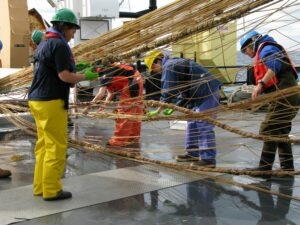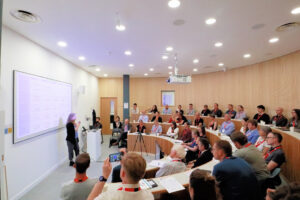Our key areas of work fall under the following themes:
Research Led Knowledge Transfer
As part of our knowledge transfer efforts (KTPs, Government and public institutions’ fundings) we have supported industry and government through research initiatives on moisture analysis and damp prevention in social housing, enhancing energy efficiency and improving living conditions. Our research has focused on improving the health of occupants and the durability of the building fabric, ensuring long-lasting and healthier homes. We have developed and assessed novel insulation systems and advanced solutions for retrofit and new build construction.
supported industry and government through research initiatives on moisture analysis and damp prevention in social housing, enhancing energy efficiency and improving living conditions. Our research has focused on improving the health of occupants and the durability of the building fabric, ensuring long-lasting and healthier homes. We have developed and assessed novel insulation systems and advanced solutions for retrofit and new build construction.
Early Career Research Network
The “UKCMB Affiliate Network” was created to foster a research community of UK and international PhD students and researchers focusing on moisture in buildings. This platform supports regular meetings, workshops, and seminars to share insights and collaborate on solutions to moisture-related challenges. IEDE PhD students involved in this network are working on projects such as assessing ventilation rates in dwellings, proposing retrofit criteria based on thermal comfort, investigating the performance of solid walls with water-repellent surface treatments, developing a geo-located database of material properties for historic solid brick buildings in London, and benchmarking indoor mould levels for the UK building stock. Our goal is to expand participant numbers and establish broader partnerships, nurturing future experts and advancing the development of resilient, moisture-resistant buildings.
Modelling Moisture in Buildings
The Technical Working Group (TWG) on modelling moisture addresses concerns and knowledge gaps, scopes research issues, and reviews, promotes, and disseminates research findings. This TWG engages national and international experts in a collaborative approach, ensuring that our work remains at the forefront of addressing building moisture-related challenges, advancing both academic and practical solutions.
International Conference on Moisture in Buildings (ICMB)
In 2021, we launched the first international conference solely focusing on moisture-related topics. The 2021 and 2023 conferences covered topics such as monitoring and modelling moisture, ventilation, airtightness, moisture in existing buildings and retrofits, materials performance, building decay, indoor mould growth, moisture in historic/traditional buildings, and the impact of moisture on health and wellbeing, as well as climate-induced moisture issues.
2021 and 2023 conferences covered topics such as monitoring and modelling moisture, ventilation, airtightness, moisture in existing buildings and retrofits, materials performance, building decay, indoor mould growth, moisture in historic/traditional buildings, and the impact of moisture on health and wellbeing, as well as climate-induced moisture issues.
Tools and Guidance
We have developed various free, accessible resources for homeowners to understand and manage mould and damp in their homes. These include animations, tools, and guidance such as “A Bit More Information About Mould,” a Moisture Balance Calculator, and detailed Moisture Guidance for both existing and new homeowners. These resources are designed to educate and assist housing providers, councils, and homeowners in effectively managing moisture-related issues.
We have actively engaged with policymakers to shape policies surrounding damp and mould in buildings. Our contributions include the BSI White Paper on the importance of standards for energy retrofit, BS40101 on Building Performance, UK Government guidance on health risks of damp and mould, BS 5250:2021 Management of Moisture in Buildings, PAS 2030, 2035, and 2038, and involvement in the BSI Retrofit Standards Task Group, among others.
Learning and Development
We have created and delivered continuous professional development courses on tackling mould and damp, sharing our knowledge and expertise with the community. The course “Understanding and Managing Moisture Risk in Buildings” aims to help create and manage healthier and safer built environments.
Online Learning Events
We have established a series of webinars and talks to educate and engage the public on various aspects of moisture and mould in buildings. Webinars’ topics have included: “Myth and Mould – Dramatising Fungi” “How is the Fungal Kingdom Adapting to the Built Environment?“, “Present Day and Future Wind-Driven Rain in the United Kingdom” and “Mould in the Fashion Industry”. These sessions aim to disseminate valuable insights and foster a deeper understanding of moisture-related issues across different sectors.
